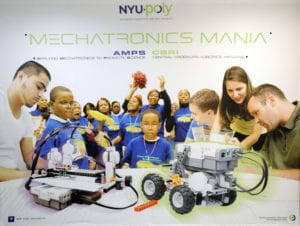AMPS CBSI
Applying Mechatronics to Promote Science (AMPS)
AMPS was a collaborative relationship between Polytechnic University and six New York City middle schools involving professors, graduate Fellows, and middle school faculty. An array of exciting activities was employed to (1) engage middle school students in science, technology, engineering, and mathematics (STEM) studies through mechatronics-enabled science labs and robotics competitions; (2) entice students to pursue STEM education and careers; and (3) provide technology literacy and professional development to teachers.

AMPS enriched the graduate education of 9 Fellows, annually, by enabling them to seamlessly integrate their mechatronics and robotics focused education and research into middle school curriculum. Fellows employed mechatronics-enabled science labs and robotics-based lesson plans to engage middle school students in hands-on scientific explorations. This allowed Fellows to develop a deeper understanding of STEM concepts and their research and an ability to recognize connections between their research and societal needs. Moreover, the project imparted pedagogical, communication, leadership, and team-building skills to Fellows. Finally, AMPS encouraged cross-pollination of education research and technical concepts among the university and school faculty.
A large number of students and schools were involved, as shown next:
Number of Participating Students and Partner Schools in Each Project Year
| Year | Number of Participating Students | Number of Partner Schools |
| 2008-09 | 724* | 12 |
| 2009-10 | 1026 | 12 |
| 2010-11 | 1116 | 18 |
| 2011-12 | 1669 | 23 |
| 2012-13 | 1574 | 24 |
| 2013-14 | 2076 | 18 |
| 2014-15 | N/A | 13 |
The broader impacts of AMPS included: (1) reinforcing STEM education of a diverse and underserved inner-city student body and preparing them for higher education and productive careers; (2) addressing the educational needs of the emerging innovation economy by developing technology-enhanced STEM instruction and lab infrastructure; and (3) broadening Polytechnic’s ties with local school districts to sustain and grow its outreach activities.
Assessment
A team of external evaluators audited the NYU SOE AMPS program.The evaluators assessed direct academic impacts such as improved academic understanding indicated by GPAs, test scores and assessments, as well as indirect impacts such as broadened skillsets and improved confidence portrayed in interviews and surveys. This data analysis performed by the evaluation team reported that about 30% of overall GPA and at least 32% of STEM GPA increased by 1 letter grade, for participating students. Reported statistics for the surveys did indicate that the overall improvement for students, indicated by increasing GPAs, was largest for year two of the program. The comprehensive results of the data analysis of the survey can be found in the following figure:
Publications
- Laut, J., V. Kapila, M. Iskander (2014) “Exposing Middle School Students to Robotics and Engineering through LEGO and Matlab,” Computers in Education Journal, Vol. 5, No. 3, pp. 2-13, ASEE [pdf]
- Suescun-Florez, E. Iskander, V. Kapila and R. Cain (2013) “Geotechnical Engineering in US Elementary Schools,” European Journal of Engineering Education, Vol. 38, No. 3, pp. 300–315, Taylor & Francis [link]
- Suescun-Florez, E. M Iskander, Cain and V. Kapila (2013) “Elementary School Geotechnical Engineering,” Geo Strata Magazine, ASCE
- Muldoon, J., P. Phamduy, R. Le Grand, V. Kapila, M. Iskander (2013) “Connecting Cognitive Domains of Bloom’s Taxonomy and Robotics to Promote Learning in K-12 Environment,” American Society for Engineering Education Annual Conference & Exposition, ASEE [pdf]
- Suescun-Florez, E., R. Cain, V. Kapila, M. Iskander (2013) “Bringing Soil Mechanics to Elementary Schools,” American Society for Engineering Education Annual Conference & Exposition, ASEE [pdf]
- Laut, J., V. Kapila, M. Iskander (2013) “Exposing Middle School Students to Robotics and Engineering through LEGO and Matlab,” American Society for Engineering Education Annual Conference & Exposition, ASEE [pdf]
- Williams, K., I. Igel, R. Poveda, V. Kapila, and Iskander (2012) “Enriching K-12 Science and Mathematics Education Using LEGOs,” Advances in Engineering Education, Vol. 3, No. 2, ASEE [pdf]
- Igel, I, R. Poveda, V. Kapila, and Iskander (2012) “Examining the Efficacy of a LEGO Robotics Training for Volunteer Mentors and K-12 Teachers,” Proc.American Society for Engineering Education Annual Conference & Exposition, ASEE [link]
- Faisal, A., V. Kapila, and Iskander (2012) “Using Robotics to Promote Learning in Elementary Grades,” Proc.American Society for Engineering Education Annual Conference & Exposition, ASEE
- Abaid, C. Yuvienco, V. Kapila and M. Iskander (2011) “Mechatronics Mania at the Inaugural USA Science and Engineering Festival,” IEEE Control Systems Magazine, Vol. 31, No. 5, pp. 105-124 [link]
- Williams, K., V. Kapila, and Iskander, (2011) “Enriching K-12 Science Education Using LEGOs,” Proc.American Society for Engineering Education Annual Conference & Exposition, ASEE [link]
- Igel, I, R. Poveda, V. Kapila, and Iskander, (2011) “Enriching K-12 Math Education Using LEGOs,” Proc.American Society for Engineering Education Annual Conference & Exposition, ASEE [link]
- Kapila, V., Iskander, and N. Kriftcher (2010) “Integrating Graduate Student Research into K-12 Classrooms: A GK-12 Fellows Project,” Proc.American Society for Engineering Education Annual Conference & Exposition, ASEE
- Sobhan, S, N, Yakubov, V. Kapila, M Iskander, N. Kriftcher (2007) “Modern Sensing and Computerized Data Acquisition Technology in High School Physics Labs”, International Journal of Engineering Education, Vol 23, No. 5, Part 1, pp. 902-909 [link]

